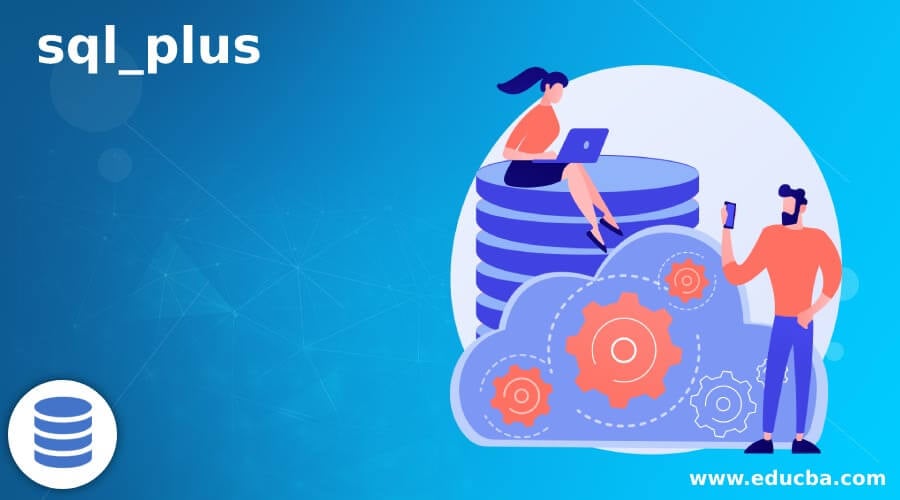Updated May 31, 2023

Introduction to SQL*Plus
SQL plus is an oracle database utility with a primary command-line interface that helps developers or programmers perform a minimum of the query and other transactional activities streamlined. The advantage of using this utility with the graphical user interface is the added privilege it provides to end-users with respect to the SQL database to perform basic operations easily for any database-related activities. After the Database 11g version of Oracle, both web-based SQL_plus with GUI in integrated form is deprecated. It only supports all administrative and non-scripting languages essentially.
What Is SQL*Plus?
SQL plus is a utility supported by Oracle database for performing some queries, including a command-line interface for manipulation and execution. It understands particular patterns of categories when it comes to an understanding and feeding specific text types. Scripts can include varied components related to them. It is restricted to queries for specific commands like SQL and includes PL/SQL blocks for parsing and managing.
There are specific categories that SQL_Plus follows in terms of SQL blocks or text, which are as follows:
- SQL Statements
- Specific environmental configurations involving SET and SHOW with control and monitoring features within them.
- PL/SQL blocks
- Specific external commands that need to be prefixed something with ! char
- All the controls interact with it.
SQL Plus follows
which SQL Plus follows :
- CONNECT
- CHANGE
- CLEAR
- COPY
- COLUMN
- COMPUTE
- VARIABLE
- STORE
- START
- TITLE
- UNDEFINE
- SAVE
- LIST
- DESCRIBE
- DEL
- BREAK
- ATTRIBUTE
- ARCHIVE LOG
- SPOOL
- WHENEVER OSERROR
- RECOVER
- PROMPT
- EXIT
- HOST
- GET
- HELP
- REPHEADER
- REMARK
- RUN
- EXECUTE
- XQUERY
- WHENEVER SQLERROR
- TIMING
- STOP
- SHUTDOWN
- SHOW
- SET
- STARTUP
- RUN
- INPUT
- DISCONNECT
- /SLASH
- APPEND
- @ at sign
- @@ (double at sign)
Use SQL Plus
- SQL Plus has a lot of usage for graphical interfaces related to queries for execution; even specific other third-party plugins can also interact for enhancement.
- Oracle database users don’t rely much on the SQL Plus-related environment because these third-party plugins have covered most topics.
- Oracle has the privilege of using SQL plus scripts for creating simple reports with some simplified hands that need to be updated with every CRON that needs to be manipulated.
- SQL plus has a lot of advancements with the components to specify some of which are as follows to include: Oracle SQL Plus worksheet, a part of ORM, a member of SQL plus worksheet for Oracle SQL Developer, Provision of utility which are web-based, Provides Oracle application Express considered as SQL workshop.
- Data can be extracted from the text file that is part of SQL*Plus.
- Queries can be tuned using EXPLAIN PLAN command, an added advantage for SQL and users.
How Can I Learn and Guide?
- There are various sources to learn SQL plus, but the recommendation is to follow genuine sources with authenticity.
- There are specific prerequisites before learning SQL plus, like SQL Plus special keys and their respective keys.
- There might be different functioning and keys to the Operating system supporting it.
- Original Oracle docs with relevant versions shall be referenced while learning.
- Oreilly and other reputed sites can be considered authentic websites for learning SQL.
- Many websites can be referenced for research and other learning activities regarding SQL Plus.
Part of SQL Plus
There are sure which are frequent as part of SQL Plus:
- SQL PLUS [ user_name, pass_word, sysadm]: To log in to the database
- HELP [INDEX | topic]: list the issue and its essentials.
- STARTUP[Parameters_to_pass]: to start the associated database.
- HOST [ command_as_parameter]: To enlist the host with the required details and execute the host commands.
- SHOW [ALL, ERRORS]: This command in SQL Plus is mainly used for showing SQL* Plus variables for systems or environment settings with manipulation.
- CONNECT[Parameters]: For connecting to the database once the connection is established.
- SET [ system variables or environmental variable]: This command is mainly used to manipulate the system or ecological variable, which is passed as a parameter for manipulation.
- EDIT: This command is used mainly for editing the contents of the SQL buffer or the file used for manipulation.
- SAVE: This command is used for saving the contents of the entire SQL buffer to a specific file.
- APPEND: This command is used for appending the text to the end of the current line in the SQL buffer.
Windows GUI
- SQL Plus supports the Windows GUI, where the GUI tools are installed to name, including TOAD and SQL developer, which most often takes SQL Plus with some good old comments.
- Specific licenses are using which SQL Plus Client can be downloaded, and it includes functions for modifying the GUI that can be used in various ways to perform actions.
- Download and extract any of the SQL plus clients to specify one SQL* Plus 12.0.xx once done, the development related to GUI can be performed, followed by some other processes.
- All the Windows GUI development will then be mapped to an oracle database supported for all the CLI-based queries to be executed.
Conclusion
SQL Plus utility provided by Oracle allows developers to execute various commands that complete the requirement. It has evolved like anything in the coming years, with integration into other databases from specific versions that have added a lot of advantages.
Recommended Articles
This is a guide to SQL plus. Here we discuss the categories SQL Plus follows in terms of SQL blocks and the command. You may also have a look at the following articles to learn more –
